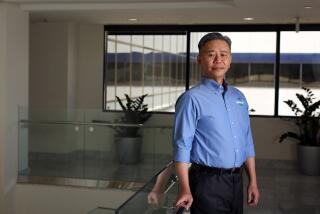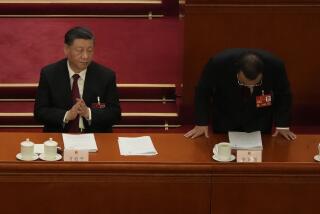China’s Hard-Line Vice President Wang Zhen, 85, Dies : Asia: One of the ‘Eight Elders,’ he opposed the liberalizing trends that set the stage for the 1989 pro-democracy protests.
- Share via
BEIJING — Chinese Vice President Wang Zhen, a hard-line ideologue who fought bitterly against political and cultural liberalization, died Friday at the age of 85, official media reported.
Wang was one in a group of eight octogenarian revolutionaries, headed by senior leader Deng Xiaoping, who ordered the brutal army crackdown on the 1989 Tian An Men Square pro-democracy protests.
Former President Li Xiannian, another in the group informally dubbed the “Eight Elders,” died last year. Several others are believed to be seriously ill.
Wang’s passing brings the nation a step closer to a key generational transition that could yield a less repressive China but also holds the potential for political disorder.
The official New China News Agency, in announcing Wang’s death, described him as “a great proletarian revolutionary, statesman and soldier, a staunch Marxist and an outstanding leader of the party and the state.”
He reportedly died Friday afternoon in the southern city of Canton “after failing to respond to medical treatment.” Wang had been hospitalized for much of the past 15 months.
In his final years, Wang’s image was that of a rigid guardian of the old order. His thinking was similar to that of the other elders, but an official 1988 biography hit the mark when it described him as “outspoken.”
As one of the top leadership’s harshest critics of any political relaxation, Wang was openly despised by many liberal-minded youths and intellectuals in Beijing.
Wang played a prominent role in opposing liberalizing trends that set the stage for the 1989 pro-democracy protests.
In 1988, he was enraged by an immensely popular television series, “River Elegy,” which used the Yellow River and the Great Wall as symbols of a conservative spirit that China must overcome in order to modernize. Wang--perhaps aware that the series was actually targeted at people such as himself--blasted the program for “reviling the Yellow River and the Great Wall and slandering the great Chinese people.”
After the failure of the hard-line coup in Moscow in August, 1991, it was Wang who issued the first terse threats to any Chinese who might be tempted to think that communism can also be overthrown here. “The People’s Liberation Army is a strong pillar of the people’s democratic dictatorship,” he warned. “It is an iron-and-steel Great Wall, defending the unity of the motherland and safeguarding the socialist system.”
Despite his unyielding stance in support of the Communist Party dictatorship, Wang was a moderate on questions of economic policy. As a vice premier from 1975 to 1980, he helped Deng rise to power as the leader of modernizing forces struggling against Maoist fanaticism.
Wang became a member of the policy-setting Politburo at a key Communist Party meeting in late 1978, when he was among the leaders who launched China on its current path of market-oriented economic reforms. He stepped down from the Politburo in 1985 but retained influence as a party elder. He was chosen for the largely ceremonial position of vice president in 1988.
Born in 1908 to a poor peasant family in Hunan province, Wang had only three years of primary education as a child. He became a railway worker in his early teens, a Communist Party member at 19 and a Red Army soldier at 21. He participated in the Long March of 1934-1935, which brought the Communists to a secure base in China’s Shaanxi province.
In Shaanxi, Wang was put in charge of the 359th Brigade, assigned to reclaim arid wasteland in the Nanniwan region to grow crops for Communist forces. His success in this effort, later memorialized in a famous propaganda song, secured the foundation of his career.
Attacked as a “counterrevolutionary revisionist” by radical leftists in the early years of the chaotic 1966-1976 Cultural Revolution, Wang was at one point paraded through the streets by youthful Red Guards. He then spent several years laboring at the Red Star state farm in Jiangxi province. He was protected from physical harm, however, by then-Premier Chou En-lai.
Although Wang in theory retired from his most important posts once he left the Politburo in 1985, he was among a handful of senior leaders who forced the ouster of Hu Yaobang from his position as Communist Party chief in 1987.
Hu, a somewhat liberal and open-minded leader, was accused of mishandling relatively small-scale student demonstrations that broke out in the winter of 1986-1987. Demotion from power made Hu a hero to those yearning for greater freedom, and his death in 1989 sparked that year’s massive pro-democracy demonstrations.
The last truly important act of Wang’s career was to join with his octogenarian colleagues in 1989 to overrule Hu’s successor, then-General Secretary Zhao Ziyang, who favored a soft line toward the student demonstrators.
The party elders instead ordered the army to shoot its way into Beijing to end the protests.
Wang had been due to step down from his vice presidential post at the annual session of the National People’s Congress, China’s nominal Parliament, which opens Monday.
More to Read
Sign up for Essential California
The most important California stories and recommendations in your inbox every morning.
You may occasionally receive promotional content from the Los Angeles Times.













